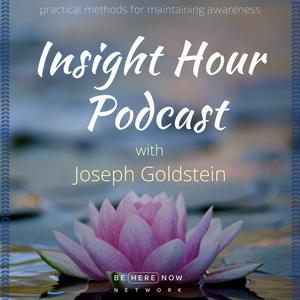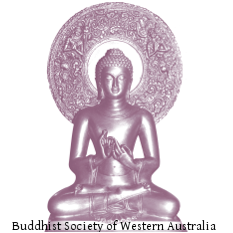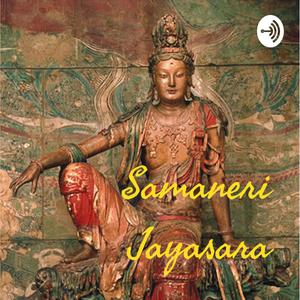
Dhammagiri Buddhist Podcasts
Dhammagiri Forest Hermitage
Dhammatalks, Chanting, Precepts and Meditation with Ajahn Dhammasiha and other experienced Senior Buddhist Monks in the Theravada Forest Tradition of Ajahn Chah. Recorded at Dhammagiri Forest Hermitage, Brisbane, Australia. You can learn more about our monastery, Ajahn Dhammasiha and our Sangha at our website: https://www.dhammagiri.net We've also got a Youtube Channel, including regular live podcasts on the weekend "Dhammatalks at Dhammagiri": https://www.youtube.com/channel/UCJINt0JJBfFm_x0FZcU9QJw Our email Newsletter: https://tinyletter.com/dhammagiri/archive .
- 23 minutes 46 secondsAJAHN X DHANIYO | Life with Luang Por Liem at Wat Nong Pah Pong, Ajahn Chah's Monastery | Dhammagiri
Ajahn X (Phra Suthanai Dhaniyo) has been a monk for 22 years, and has lived and trained for 16 years with Luang Por Liem at Wat Nong Pah Pong, Ajahn Chah's original monastery.
Ajahn shares some of his experiences of life at Wat Pah Pong, and reflects on teaching he has received from Luang Por Liem personally.
Dhammagiri Website
Our Spotify Playlists
Newsletter
Dhammagiri Youtube Channel
#buddhism #dhamma #ajahnchah #buddhistmonk #wisdom
14 November 2024, 11:49 pm - 31 minutes 8 secondsVipassana: Observing Without Interfering | Ajahn Dhammasiha | Insight Mindfulness Sati
Vipassana comes from the Pali verb 'Vipassati' = 'to see clearly'.
To practise Vipassana, we have to train ourselves to watch as a neutral, uninvolved, observer. We can't interfere or manipulate things we observe, just as a researcher can't manipulate the experiment, if he wants to really find out how reality works.
However, there are certain areas, certain features of reality the Buddha is pointing us to. They are there all the time, we don't have to create them, they are part of nature. But we overlook them constantly due to delusion, and if the Buddha points out where to direct our 'Clear Seeing' towards, then it's easier to finally recognize what has been always there, but hidden but defilements:
- Anicca - Impermanent, unreliable, unsure
- Dukkha - Ultimately disappointing, suffering
- Anattā - Not Self, not me, not mine
There's also a post in our Dhamma Reflections blog on the same subject here.
Dhammagiri Website
Our Spotify Playlists
Newsletter
Dhammagiri Youtube Channel
#vipassana #insight #mindfulness #sati #dhamma #meditation
10 November 2024, 8:00 pm - 32 minutes 33 secondsPerception und Consciousness | Saññā & Viññāna | Ajahn Dhammasiha | Buddhism
Ajahn Dhammasiha is asked about the difference between perception (Pāli: saññā) and consciousness (Pāli: viññāna), and how we can distinguish these two in our experience.
The question is important, as both are part of the 5 Groups of Clinging (pañcupādānakkhandhā), which are the five focal points of attachment and identification.
To abandon attachment, and to see through the illlusion of self, we have to carefully investigate the 5 Groups of Clinging as they arise in our present experience. And to investigate them successfully, naturally, we have to know what each of them actually are, and how they differ.
Dhammagiri Website
Our Spotify Playlists
Newsletter
Dhammagiri Youtube Channel
#consciousness #perception #awareness #clinging #attachment #dhamma
4 November 2024, 11:08 pm - 36 minutes 20 secondsHow to Develop Mudita Sympathetic Joy | Ajahn Dhammasiha | Dhamma Talk
Prompted by a question from the audience, Ajahn Dhammasiha shares reflections on the theme of developing Sympathetic Joy (Muditā).
Muditā is on of the four Divine Abodes (Brahma-vihāra), together with loving kindness, compassion and equanimity.
Sympathetic Joy is the quality of rejoicing and feeling happy in other beings success.
It's the very opposite of envy and jealousy.
Ajahn suggests a similar approach as in developing mettā: We imagine someone we really like anyhow, and then remember some wholesome achievement they accomplished.
Next we use a mantra like formula, like for instance:
"May you enjoy all your success!" or similar.
We continue till we can really feel the corresponding emotion.
However, we have to be careful that we only delight in wholesome success...
Dhammagiri Website
Our Spotify Playlists
Newsletter
Dhammagiri Youtube Channel
#mudita #sympatheticjoy #brahmavihara #divineabidings #buddhism
31 October 2024, 8:30 pm - 29 minutes 29 secondsSix Obstructions for Mindfulness | Sati | Satipatthana | Dhamma Talk | Ajahn Dhammasiha
In the famous discourse on the 'Foundations of Mindfulness' (Satipaṭṭhāna) the Buddha promises us that we can attain Nibbāna or Non-Returning in just 7 days, if we practise as descibed by him.
Why, then, are we still enmeshed in suffering?
Ajahn Dhammasiha describes six obstructions that we have to abandon first - otherwise we're not able to practise Satipaṭṭhāna in the way the Buddha described them:
- Delight in Work
- Delight in Chatting (including social media!)
- Delight in Sleep
- Delight in Socialising (including social media!)
- Lack of Sense Restraint
- Not knowing the Right Measure when Eating
- [Anguttara Nikāya/Numerical Discourses, Book of Sixes, #117
Dhammagiri Website
Our Spotify Playlists
Newsletter
Dhammagiri Youtube Channel
#mindfulness #sati #vipassana #meditation #dhamma #buddhism
28 October 2024, 8:30 pm - 24 minutes 56 secondsConsistent Practice & How to Prevent Unwholesome Mindstates | Ajahn Dhammasiha | Buddhism
Ajahn Dhammasiha responds to two closely related questions from the audience:
1.
We may experience highs and lows in our meditation practice. Sometimes it even seems like we're suddenly back to zero, almost like riding a roller coaster.
How can we make our Dhamma practice more consistant?
2.
How can we prevent unwholesome mindstates from arising?
This is actually the first of 4 factors of Right Effort (sammā-vāyāma), number six in the Noble Eightfold Path: Rather than trying to abandon unwholesome states once they have come up, it's better to 'nip them in the bud', as they say, by eliminating the conditions that potentially cause defilements to arise in the first place.
Dhammagiri Website
Our Spotify Playlists
Newsletter
Dhammagiri Youtube Channel
#dhamma #buddhism #dhammatalk #dhammatalks #righteffort #sammavayama
24 October 2024, 8:30 pm - 43 minutes 50 secondsMine Making: Investigating Upadana at the Food Buffet | Ajahn Dhammasiha
Dependent Origination (Paṭicca Samuppāda) is one of the core teachings of the Buddha.
However, it is a teaching that the Buddha himself described as 'deep, profound, subtle, difficult to see...'.
Ajahn Dhammasiha explains how we can observe aspects of dependent origination during a common, every-day activity:
Taking food from a buffet! 🍚🍛🥄🥣
Ajahn offers reflection how we can observe the relationship of:
Sense Contact (phassa)
Craving (taṇhā)
Clinging / Grasping (upādāna)
While taking food from the buffet.
The moment we lift up some food from the buffet, and put it onto our plate, something remarkable and very powerful happens in our mind:
We now regard this food as 'mine', it has somehow become 'my food'.
However, nothing has changed in the food. It's still the same food. But once it's on our plate, something has very much changed in our mind, 'mine-making' has occurred.
We have actively done something to dramatically change our attitude to that food, by taking possession of it mentally.
This same process of mine-making we do all the time, every moment with all 5 groups of clinging (pañc'upādānakkhandhā):
- Form / Body (rūpaṃ)
- Feeling (vedanā)
- Perception (saññā)
- Intention / Will (sankhārā)
- Consciousness (viññāṇaṃ)
However, it's more difficult to clearly see in regards to these 5 groups of clinging.
What's happening with our mind at the buffet is easier accessible to direct observation, and can get us started in investigating upādāna.
If we can carefully, mindfully observe how we're doing 'mine-making' while taking food from the buffet (or even while buying a new iPhone from the shop), we can hopefully understand how upādāna arises in our mind, and then STOP mine-making.
That would be all that's required to fully liberate ourselves:
If we stopped all mine-making, our heart would be fully released and experience Nibbāna!
Dhammagiri Website
Our Spotify Playlists
Newsletter
Dhammagiri Youtube Channel
#upadana #minemaking #dependentorigination #paticcasamuppada #dhamma
21 October 2024, 8:30 pm - 39 minutes 21 secondsMetta is Excellent, but Don't Neglect Mudita & Karuna | Compassion Sympathetic Joy | Ajahn Dhammasiha
Loving Kindness is an extremely beneficial mental quality, and an excellent meditation object. However, in some situations Compassion (Karuṇā) or Sympathetic Joy (Muditā) may work even better to overcome unwholesome mind states, and develop wholesome ones.
(Of course, there is also the extremely important 4th 'Divine Abiding' (Brahmavihāra), namely Equanimity (Upekkhā), but that will have to be covered in another talk)
Dhammagiri Website
Our Spotify Playlists
Newsletter
Dhammagiri Youtube Channel
#karuna #compassion #mudita #sympatheticjoy #brahmavihara #divineabodes
18 October 2024, 8:00 am - 29 minutes 17 secondsNot-Self Anatta - What Does that Mean? | Ajahn Dhammasiha | Not Self or No Self? | Buddha Dhamma
Ajahn Dhammasiha responds to a question from the audience:
What's the meaning of Anatta ( Not Self ) ?
In particular, Ajahn reflects about the important distinction between Not Self (anatta), which the Buddha expounded very frequently, and No Self (natth'attā), which the Buddha actually never taught.
Dhammagiri Website
Our Spotify Playlists
Newsletter
Dhammagiri Youtube Channel
#anatta #notself #not-self #buddhism #dhammatalk
14 October 2024, 8:30 pm - 2 minutes 16 secondsBuddhist Blessing at Dhammagiri | Monks Chant Anumodana & Sharing Good Karma
Ajahn Dhammasiha and Ajahn Moneyyo recite the traditional Pali verses of blessing, anumodanā, and sharing of merits with departed loved ones.
This is what we chant every day for our kind and generous donors, when they offer alsmfood for the monks' daily meal.
You can read the full Pali text and English translation in this blog post on our website.
Below is only about half the chant, as much as fits into the podcast description:
"Yathā vāri-vahā pūrā
paripūrenti sāgaraṃ
Evam-eva ito dinnaṃ
petānaṃ upakappati.
Icchitaṃ patthitaṃ tumhaṃ
khippam-eva samijjhatu;
Sabbe pūrentu sankappā
cando paṇṇa-raso yathā
maṇi joti-raso yathā.
As all the water in the streams
is flowing to the boundless sea,
Just likewise all your offerings
are flowing to the spirit world.
And all you wish for and desire
shall soon and safely be attained;
May wholesome wishes be fulfilled
just like the moon at full-moon night
just like a wish fulfilling gem.
Sabb'ītiyo vivajjantu,
sabba-rogo vinassatu;
Mā te bhavatv-antarāyo,
sukhī dīgh'āyuko bhava.
May all distress come to an end,
may all desease be quickly healed,
May all your problems be resolved,
may you live long and happily.
Abhivādana-sīlissa,
niccaṃ vuḍḍh'āpacāyino;
Cattāro dhammā vaḍḍhanti:
Āyu vaṇṇo sukhaṃ balaṃ.
When someone's always honouring
the elders worthy of respect,
Then they will grow in these four things:
long life, strength, beauty, happiness.
( ... )
(Not enough space in this description to include everything)
Also, please note the monks only chant the Pali part, English translation above is just for your information.
Dhammagiri Website
Our Spotify Playlists
Newsletter
Dhammagiri Youtube Channel
#blessing #anumodana #sharingmerits #buddhistchanting #palichanting
10 October 2024, 8:30 pm - 35 minutes 53 secondsMarriage: Romantic Love is NOT Enough | Buddhist Dhamma Talk | Ajahn Dhammasiha
A couple getting married was interested to get some advice on Buddhist teachings how to make a marriage work, so that it lasts long and both spouses can live in harmony.
Ajahn Dhammasiha cites a study done in Italy with functional MRI brain scans, that claimed to have found that the feeling of romantic love biologically is not designed to last for decades.
In fact, the researchers considered the absolute maximum duration as approximately 4 years or so (though often it is much shorter).
This seems to agree with personal experience of most people.
As marriage is usually supposed to last a whole lifetime, it follows that romantic love lasting max 4 years can not be a sufficient foundation.
Instead, a married couple has to build up other qualities in their relationship, which sound much less 'romantic', but actually do last for a lifetime...
Dhammagiri Website
Our Spotify Playlists
Newsletter
Dhammagiri Youtube Channel
#wedding #marriage #love #commitment #respect #buddhism #dhamma
7 October 2024, 9:44 pm - More Episodes? Get the App
Your feedback is valuable to us. Should you encounter any bugs, glitches, lack of functionality or other problems, please email us on [email protected] or join Moon.FM Telegram Group where you can talk directly to the dev team who are happy to answer any queries.
 Insight Hour with Joseph Goldstein
Insight Hour with Joseph Goldstein
 Buddhist Society of Western Australia
Buddhist Society of Western Australia
 The Wisdom Podcast
The Wisdom Podcast
 Wisdom of the Masters
Wisdom of the Masters
 The Way Out Is In
The Way Out Is In
 Heart Wisdom with Jack Kornfield
Heart Wisdom with Jack Kornfield